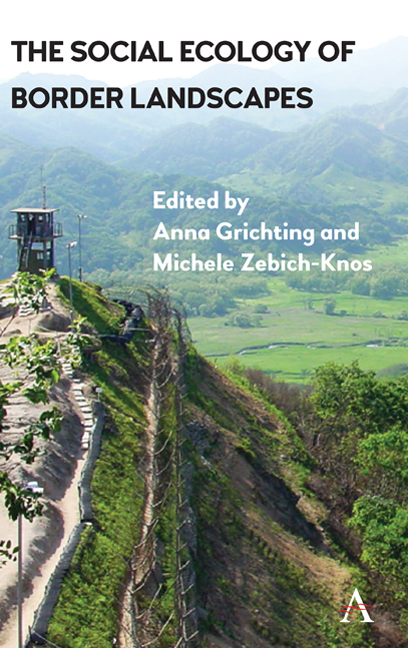Book contents
- Frontmatter
- Contents
- List of Illustrations
- Preface
- List of Contributors
- Introduction: Social Ecologies and Borderlands
- Part I FRAMES: MAPPING SOCIAL ECOLOGIES IN BORDER TERRITORIES
- Part II BRIDGES: RESILIENCE, RESTORATION AND RECLAMATION
- Part III CORRIDORS: CATALYSTS AND COLLABORATION IN CONFINED SPACES
- Part IV PORTALS: DIALOGUE, EXCEPTION AND RETERRITORIALIZATION
- Chapter Eleven Australia Day: A Social Ecology Dialogue across Aboriginal and White Cultures
- Chapter Twelve Re-legislating the Soil: Enclosures and Exception at the Amazon Frontiers
- Chapter Thirteen Mediterranean Edges: Reterritorializing Natural and Social Ecologies
- Conclusion: Making Sense of Social Ecology, Borders and the Environment
- Index
Chapter Thirteen - Mediterranean Edges: Reterritorializing Natural and Social Ecologies
from Part IV - PORTALS: DIALOGUE, EXCEPTION AND RETERRITORIALIZATION
Published online by Cambridge University Press: 10 January 2018
- Frontmatter
- Contents
- List of Illustrations
- Preface
- List of Contributors
- Introduction: Social Ecologies and Borderlands
- Part I FRAMES: MAPPING SOCIAL ECOLOGIES IN BORDER TERRITORIES
- Part II BRIDGES: RESILIENCE, RESTORATION AND RECLAMATION
- Part III CORRIDORS: CATALYSTS AND COLLABORATION IN CONFINED SPACES
- Part IV PORTALS: DIALOGUE, EXCEPTION AND RETERRITORIALIZATION
- Chapter Eleven Australia Day: A Social Ecology Dialogue across Aboriginal and White Cultures
- Chapter Twelve Re-legislating the Soil: Enclosures and Exception at the Amazon Frontiers
- Chapter Thirteen Mediterranean Edges: Reterritorializing Natural and Social Ecologies
- Conclusion: Making Sense of Social Ecology, Borders and the Environment
- Index
Summary
Introduction
Be they natural or artificial, borders are what link and divide. They impede circulation but enable passage and exchange of humans, of goods and of ideas. From time immemorial, especially when drawn across arable land or narrow straits, they have been ribbonlike swaths of intense conflict. While borders striate the surface of our globe, conflict dictates that some are more visible than others, particularly those that separate North and South, between the United States and Mexico or Latin America on one side of our hemisphere and those separating Europe from Africa. In this chapter, I will focus on the Mediterranean, broadly defined, the sea whose width — on his maps drawn around 145 CE — Ptolemy extended far beyond the limits the modern world has known. At any and every point it has been a site of crossing and a barrier for a myriad of cultures and populations. For economic and increasingly ecological reasons the sea has accrued importance as a source of water and food production. At the same time, Fernand Braudel reminds us, while it is more important than ever for sustaining the large populations huddled around it, the Mediterranean is a site of global exchange of goods and people. Under the impact of postcolonial as well as global migration and policies owing to fears of fundamentalism and terrorism, it has become, once again, a seemingly impermeable border.
A tightening of borders is taking place at the very moment when their loosening is urgently needed for the causes of both social and natural ecologies. Thus, when seen not as a sea but as a border, the Mediterranean must be considered in equally theoretical and practical terms. In the context of a reshaping of social processes that defines national identities, the Mediterranean assures constant passage of ships and their cargoes in every cardinal direction. More delicately, where migration is at stake, the Mediterranean becomes the site of the transference of peoples of vastly different origin, language, and social process. When populations move across its waters to land and to live in different milieus, we witness how adaptation to new and different environments on the part of peoples’ different origins compels us to think of ecology in both physical and human terms.
- Type
- Chapter
- Information
- The Social Ecology of Border Landscapes , pp. 231 - 242Publisher: Anthem PressPrint publication year: 2017



